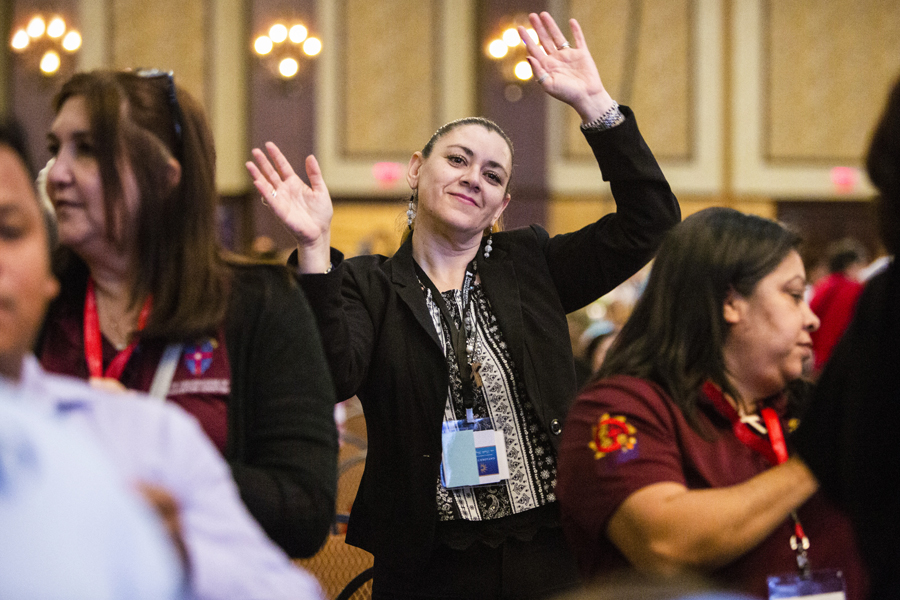Diverse voices speak into, and about, V Encuentro

About 40 delegates from the Diocese of Fort Worth will take the experience and lessons of the national V Encuentro back to their parishes. (NTC/Jayme Shedenhelm)
GRAPEVINE —Elizabeth Garcia’s V Encuentro journey began more than a year ago with a walk around her Fort Worth neighborhood.
“We went door-to-door to introduce ourselves and tell people we came from the Church,” recounts the Northside resident who belongs to the predominantly Hispanic All Saints Parish.
After handing out a flyer with the Mass times and activities, Garcia gently guided the casual conversation to something more substantive.
“We asked how the family was doing and how they were feeling,” Garcia explains, describing her first steps as a missionary disciple. “I want to make us a closer as a community—not just a parish community—but a parish that goes out into the community.”
The marriage preparation volunteer from the Diocese of Fort Worth is one of 3,000 Catholics from around the United States who shared what she learned about immigrant neighbors living on the peripheries of society during V Encuentro, now convened in Grapevine, Texas from Sept 20-23. Organized by the U.S. Conference of Catholic Bishops, the landmark event will help develop strategies and resources to better serve the booming population of Hispanic Catholics in America. Today, 40 percent of all Catholics in the country have a Hispanic background.
People of Mexican heritage account for two-thirds of the U.S. Hispanic population with those of Puerto Rican descent the next largest group. More than a million residents have familial ties to El Salvador, Cuba, the Dominican Republic, and Colombia.

Many delegates enjoyed the music that introduced most sessions. (NTC/Jayme Shedenhelm)
Delegates attending V Encuentro reflect the diversity of American Hispanic/Latinos. When Carmen Ciriaco arrived in the U.S. from Peru 30 years ago, she faced the same obstacles now challenging new immigrants.
“It wasn’t easy,” she admits. “I learned English in my country but I wasn’t fluent. Communicating was difficult. I didn’t have papers and not much money.”
Faith and hope became her currency. The delegate from Queens, N.Y. would attend an English Mass at the nearby Catholic Church and pray.
“I think if God calls you, and you follow Him, He opens the way,” says the Queen of Angels parishioner who considers evangelization an important focus during the Encuentro process.
Consumed by surviving in a foreign culture, Catholic immigrants she meets often place religion and church involvement on a back burner. That’s something the former hotel maid understands.
“We’re here to help the Spanish community know Jesus,” Ciriaco says describing her main Encuentro goal. “We have to do everything possible to help them keep our traditions and not give up the faith!”
Drawing on her experiences with young adult ministry at Our Lady of Guadalupe parish in Lathrop, Calif., Fatima Serrano has a similar concern. Hispanics are leaving the Church and the exodus is happening at an earlier age.
“Statistically, many youth leave the Church at the age of 12,” she says citing information culled from a theology course.
“What is going on? What can we do? We can’t just look at the parish. It’s the families. We have to serve them better.”
The delegate from the Diocese of Stockton, Calif. hopes V Encuentro leads to more effective formation and activities that will engage young Catholics—especially young Hispanic Catholics—beyond preparing for the sacraments.
“Once they leave, it’s hard to get them back,” Serrano says knowingly.
Participation in a Catholic youth group kept her tethered to the faith.
“That’s where the learning happened,” the registered nurse continues. “My mom and dad worked hard to give us a better life. Sometimes parents come home and don’t have time for a catechism lesson or they don’t know enough about the basics to teach one.”
Serrano feels blessed to be part of V Encuentro and voice the issues affecting youth and young adults.
“Our biggest struggle is what happens after Confirmation. What’s going to happen to that faith — that fire they have burning in their hearts?” she asks. “I hope we can make a positive difference even if it is in small ways.”
Nestor Gonzalez has high expectations for the Encuentro process.
Only nine percent of Manchester, N.H. — the city where he lives — is Hispanic but the number is growing, according to the former Dominican Republic resident.
“I’ve been preparing for this a long time starting at the parish,” says the young adult who sings in the choir at St. Anne-St. Augustin Church. “We want to improve and make our community better. A lot of leadership is needed in the Church.”
He hopes the ideas and recommendations that emerge from Encuentro will empower Hispanics and encourage them to become more involved in the parish. Too many Hispanic Catholics suffer from depression or loneliness and feel isolated.
“We have to make people living alone part of the community,” he insists. “We have to come together and work together. After all, it’s our Church.”
